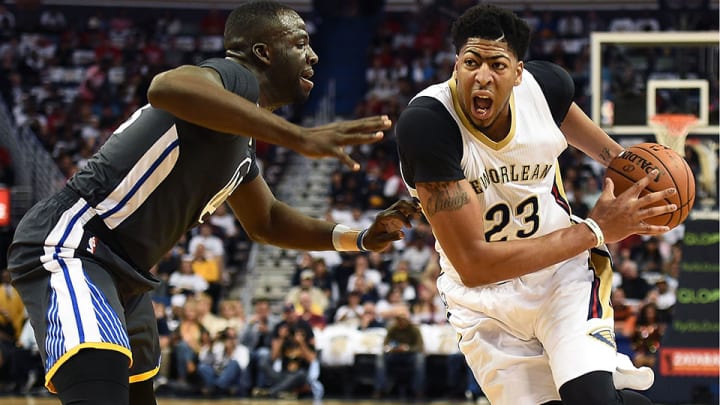Reeling Pelicans have only themselves to blame for horrible start to season

After 10 games and nearly as many disappointing efforts, the once-promising Pelicans are left searching for answers. Acknowledgement of their injuries is no longer sufficient excuse; the failings thus far in New Orleans run too deep for that, with so many of their errors easily avoidable. This team is short-handed. It’s also playing without the kind of verve and backbone that allow undermanned teams to survive.
That combination has landed the Pelicans, in their first season under head coach Alvin Gentry, squarely at the bottom of the defensive standings. New Orleans had set lofty expectations for its improvement on that side of the ball after finishing in the bottom 10 in points allowed per possession last season. Those hopes, while not completely dashed, have been challenged fully in the team’s 1-9 start. Playing with an incomplete roster tests the ability of should-be reserves, the commitment of a team’s core players, and the vision of a coaching staff. None of the above has yet lived up to their end of the bargain.
NBA Power Rankings: Warriors, Cavs remain on top; Heat shoot up to No. 4
This leads to blunder and misstep from a generally sensible system. New Orleans’s adjusted scheme is intended to curb dribble penetration and isn’t. Blame for that begins with those playing on the perimeter for the Pelicans, who don’t guard up and into an opposing ball-handler often enough nor adequately handle their responsibilities away from the ball in terms of eating up space and making the proper rotations. The help, on the whole, isn’t making it to the right spots in time to put the principles of the defense into action.
Teams in systemic transition are vulnerable to this kind of lag until all involved get up to speed. What makes the Pelicans’ case exceptional are their flimsy efforts and troubling lack of focus—factors which allow a capable team to effectively beat itself. There’s just no excuse for a lapse like this down the stretch of a competitive game:
Or the kind of miscommunication here that allows an opposing cutter to get the best of two Pelicans defenders:
Anthony Davis, whose possession-to-possession interest in playing stout defense has waned this season (perhaps as a result of the load he bears offensively, to be fair), is as guilty as any Pelican. His length, quickness, and quick reflexes can do a world of defensive good when applied in constructive ways. Instead, Davis has begun to check out on some plays still in progress:
New Orleans, frankly, doesn’t have a good enough playing rotation at the moment to cut corners. The team’s two primary creators from the perimeter are either absent (Tyreke Evans) or under a minutes restriction (Jrue Holiday). The lineup is warped in a way where players like Ryan Anderson are forced out of their comfort zones to carry the second unit in scoring. Both backup guards (Ish Smith and Toney Douglas) were 11th-hour additions made after Norris Cole went down with an injury. The wing rotation has cinched up in a way that leaves Alonzo Gee and Dante Cunningham as the most sensible options at the three. Both traditional centers on the roster (Omer Asik and Alexis Ajinca) are hampered by injuries. There is no margin for error with this current group, and yet so many Pelicans are playing fast and loose with even basic defensive fundamentals.
• Open Floor podcast: Kobe, Nets, Kings and more with Chris Mannix
More excruciating yet: We’ve seen stretches of decent defensive play from this bunch, though it tends not to last. Their game-to-game formula is well worn by this point. Even those nights that begin with a quarter or two of good coverage tend to fall apart by game’s end. The first-half Pelicans have allowed 103 points per 100 possessions this season—not a particularly good mark, but one far from the league’s worst. The second-half Pelicans have given up a crippling 114.9 points—a red flag that persists even after accounting for the randomness of blowout scenarios. New Orleans has shown it can survive its injuries and proceeded to contradict the point within minutes, giving away games at a time where every win is precious.
Nothing much has changed in regard to how good the Pelicans could ultimately be. Their long game, however, has been compromised by more than mere injury. Better health would shore up New Orleans's rotation. More important, though, would be the return of the Pelicans' competitive mettle. A playoff hopeful sitting at 1-9 has to find a way to give a damn about the details. Anything less will see the West pass the Pelicans by, unforgiving of the fate they made for themselves.

Rob Mahoney is an NBA writer dedicated to the minutiae of the game of basketball, its overarching themes and everything in between. He joined the Sports Illustrated staff in 2012.